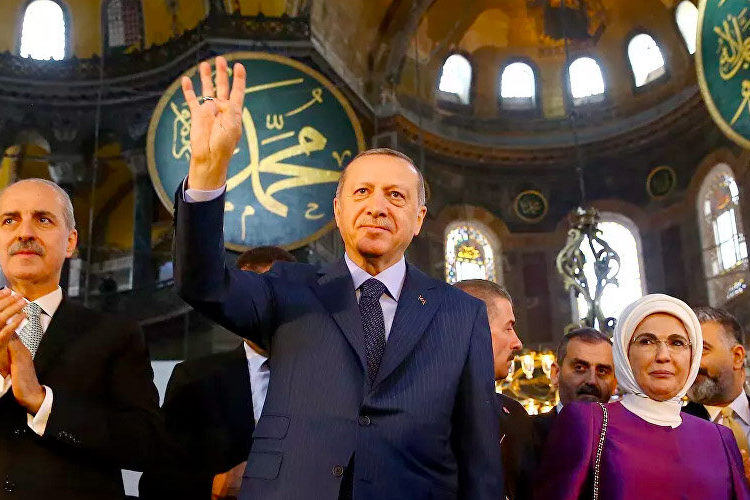Nordic Monitor
Numan Kurtulmuş, a former deputy prime minister and minister of culture and tourism and current deputy chairman of the ruling Justice and Development Party (AKP), has stated that the legacy for Jerusalem should be Turkey’s next responsibility after the Hagia Sophia, the Karar daily reported.
“Now we have in front of us Al Quds Sharif [Jerusalem], the legacy of Caliph Umar [Umar ibn al-Khattab, the second caliph of Islam], Saladin Ayyubid [the founder of the Ayyubid dynasty who captured Jerusalem in 1187 from Christian Crusaders] and Sultan Selim the Grim [Ottoman sultan who transferred the caliphate to the Ottoman dynasty in 1517], and it must remain in a corner of our minds,” Kurtulmuş said during a video conference organized by the Önder Foundation, the oldest alumni association of religious imam-hatip schools in Turkey.
Addressing the nation regarding his decree on July 10 ordering the conversion of Hagia Sophia back into a mosque after the top administrative court annulled a 1934 presidential decree that made it a museum, President Recep Tayyip Erdoğan had pointed out that “the resurrection of Hagia Sophia heralds the liberation of the al-Aqsa Mosque.” Erdoğan had issued a decree transferring control of Hagia Sophia to the Religious Affairs Directorate (Diyanet), removing its status as a museum and once again converting the building into into a mosque.
In his national address President Erdoğan said: “[T]oday, Hagia Sophia is having another resurrection, many of which it has witnessed since its construction. The resurrection of Hagia Sophia heralds the liberation of the al-Aqsa Mosque [from Israel]. The resurrection of Hagia Sophia is a [sign] of the will of Muslims across the world to emerge from the interregnum.” The al-Aqsa Mosque, the third holiest site in Islam, is a frequent flashpoint in the Israeli-Palestinian conflict. The Turkish president often invokes the al-Aqsa Mosque in Jerusalem’s Old City to rally the Islamic world.

Erdoğan’s triumphalist act was welcomed by traditional nationalist and religious segments of Turkish society, and AKP officials used it for propaganda campaigns in Turkey.
“It is the responsibility of our nation to fulfill the legacy of ‘La Ilahe Illallah, Ibrahim Halilullah [There is no God but Allah, Abraham is his friend]’ written at the top of the Hebron Gate, as a dream, as a goal in the coming days,” Kurtulmuş told members of the Önder Foundation.
The conversion of Istanbul’s Hagia Sophia into a mosque was “a dream come true for our generation, who said break the chains,” Kurtulmuş said.

In the wake of the decision of the Council of State on the status of the Hagia Sophia, US Secretary of State Mike Pompeo said in a statement that the United States “urges the government of Turkey to continue to maintain the Hagia Sophia as a museum, as an exemplar of its commitment to respect the faith traditions and diverse history that contributed to the Republic of Turkey, and to ensure it remains accessible to all.”
AKP Deputy Chairman Kurtulmuş responded to Pompeo, saying that “[t]he sole decision-making authority about the status of Hagia Sophia, a matter of Turkey’s national sovereignty, is only belong to Turkey. We do not need anyone’s call or recommendation on our own affairs.”

He also revealed his dream about the conversion of Hagia Sophia into a mosque during his previous positions as a member of the Turkish government. In August 2017 Kurtulmuş, minister of culture and tourism at the time, inspected restoration that was underway in Hagia Sophia.
Following his visit Kurtulmuş stated that “Hagia Sophia became a mosque as a result of Mehmed II – the right of the conqueror. It was turned into a museum by a decision of the cabinet. At the present time, there is no such issue [conversion into a mosque] on our agenda; still, I must reiterate the fact that the Hagia Sophia remains Sultan Mehmed the Conqueror’s right by conquest.”

President Erdoğan ordered the conversion of the country’s historic Hagia Sophia back into a mosque after the top administrative court annulled a 1934 presidential decree that had made it a museum. Shortly after the court released its long-anticipated decision, Erdoğan issued a presidential decree transferring management of the site from the Ministry of Culture to the Diyanet, paving the way for its conversion.
The Hagia Sophia opened as a mosque on July 24, the anniversary of the Treaty of Lausanne, signed between the Allied powers and Turkey, which drew the boundaries of modern Turkey. The UNESCO World Heritage Site was originally built as an Orthodox Christian cathedral before being converted into a mosque after the Ottoman conquest of the city in 1453.
President Erdoğan on July 24 attended the first Friday prayer, an official ceremony, at Hagia Sophia, a crowning moment for him after 18 years at the helm of Turkish politics. Thousands of Muslim faithful came from across Turkey and quickly filled the area outside the mosque. However, around 1,000 people were let inside through security checkpoints, while others laid out prayer rugs outside to join in the inaugural prayers.












